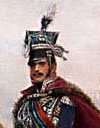Seventy-five miles and seven days later the leading elements of the French army entered the gates of Moscow. Their advance from Borodino can hardly be called a pursuit; a respectful follow-up would be a more accurate description. Several fierce rear-guard actions were fought, but Kutusov made no attempt to make a second stand. Early on September 14, the aged Russian soldier abandoned Russia's religious capital and drew away to eh southeast toward Kolumna. His rear guard commander, Miloradovitch, thereupon made contact with General Sebastiani of the Second Cavalry Corps, and agreed to give up Moscow without a fight in return for the right of unhindered evacuation. In earlier years such an arrangement would never have been agreed to by Napoleon, but on this occasion the Emperor was only too grateful to gain possession of the Russian capital without further effort. His men were ragged, exhausted by heat and thirst, and riddled with disease, typhus and dysentery wreaking as much havoc in the ranks as Russian bullets. Only 100,000 men now remained in the ranks of the main army.
Murat, suitably arrayed in his most gorgeous uniform, was one of the first Frenchmen to enter Moscow at midnight on the 14th. There were few spectators to admire his magnificence, however, for not only was the hour late but the governor had ordered most of the 300,000 inhabitants to leave the city. The following day Napoleon arrived with his suite and took up quarters in the Kremlin.
Moscow was his, but would the Tsar now come to terms? Napoleon was still hopeful. However, that very night serious fires broke out in the city's bazaar quarter. It seemed that the Russian will was still unbroken; perhaps the journey to Moscow had been in vain.
~ D. Chandler, The Campaigns of Napoleon, p. 809-810

























































No comments:
Post a Comment